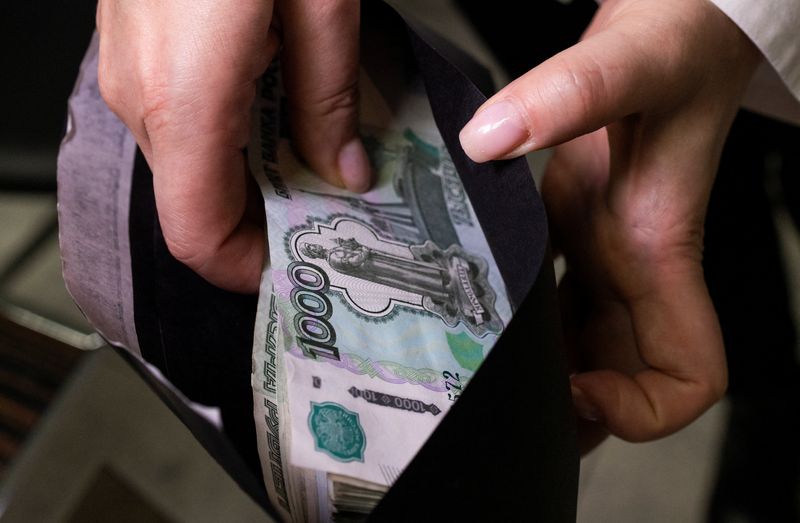By Gleb Bryanski and Alexander Marrow
MOSCOW (Reuters) -Russia's central bank said on Wednesday it would stop foreign currency purchases in order to ease pressure on the financial markets after the rouble weakened beyond 110 to the U.S. dollar, down by one-third since early August.
The central bank said it had decided not to buy foreign currency on the domestic market from Nov. 28 until the end of the year, but to defer these purchases until 2025.
"The decision was made to reduce the volatility of financial markets," the regulator said in a statement. Since Russia was blocked from using the dollar and euro, it has made foreign exchange interventions using Chinese yuan.
Russia published new economic data on Wednesday highlighting the latest signs of overheating in an economy retooled for the purpose of fighting the war in Ukraine, which has sucked workers out of the labour force.
Real wages were up 8.4% in September in year-on-year terms, unemployment hit a record low 2.3% in October, and weekly inflation stands at almost 0.4%, all despite a benchmark interest rate of 21%.
By 1600 GMT, the rouble was down 7.25% since the start of Wednesday's trade at 113.15 to the dollar, according to LSEG data - further fuelling inflation, which is running at around 8% a year.
It fell beyond 15 to the yuan, also the lowest level since March 2022, just after Russia's invasion of Ukraine.
Under Russia's budget rule, the finance ministry sells foreign currency from its rainy-day National Wealth Fund to make up for any shortfall in revenue from oil and gas exports, or makes purchases in the event of a surplus.
The ministry's forex transactions are carried out by the central bank, which also conducts its own interventions.
The central bank said it would continue conducting its own yuan sales at the equivalent of 8.4 billion roubles a day, thereby increasing the Russian state's net daily sales of foreign currency to the equivalent of 8.4 billion roubles from around 4.2 billion roubles.
Dmitry Pyanov, deputy CEO of Russia's second largest lender VTB, said sanctions imposed by the United States on Russia's third-largest lender, Gazprombank, which handles the energy trade, were behind the rouble's sharp fall.
"My assumption is that the sanctions against Gazprombank have had a significant impact, as it has ceased to be a channel for delivering foreign currency to the Moscow Exchange," Pyanov said.
He said the central bank should focus on stabilising the currency market, which was not functioning properly now, within the next few days.
PSB Bank analysts said the decision would "moderately support the rouble, but it will not be enough to return the exchange rate to last week's levels", predicting that the market would stay volatile.
ROUBLE AND SHARE PRICES BOTH FALLING STEEPLY
The rouble's fall has been compounded by a fall of more than 20% in the stock market so far this year as investors shift their savings from stocks to deposits, which offer interest above the benchmark rate of 21%.
Economy Minister Maxim Reshetnikov said the rouble's volatility was due to global dollar strength and market concerns following the latest sanctions, not the result of fundamental factors, predicting that it would soon stabilise.
He said 82% of Russia's exports and 78% of its imports were paid for in roubles and "friendly", non-Western countries' currencies.
Analysts said another measure that the government could use is forcing exporting companies to sell more foreign currency by raising mandatory sale requirements, though not all were convinced this would work.
"If exporters are unable to make transactions [due to sanctions], the requirement from the government for them to do so will not help the situation in any way," economist Evgeny Kogan said.
The rouble's fall is fuelling inflation, which is set to exceed the central bank's estimate for this year, working counter to the regulator's painful monetary tightening, with the benchmark interest rate at its highest level since 2003.

The central bank estimates that a 10% fall in the value of the rouble adds 0.5 percentage points to inflation, implying that the fall of the last four months may be adding 1.5 percentage points to inflation.
All trade in dollars and euros moved to the over-the-counter market after Western sanctions were imposed on the Moscow Exchange (MOEX). As a result, the trade has become volatile and opaque, with most banks disclosing data only to the regulators.